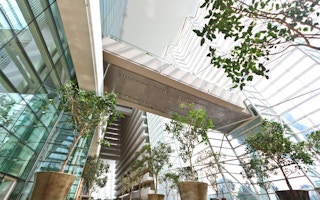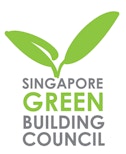Recycled construction materials and energy efficient fittings may make a building sustainable, but it takes more than just brick and mortar to inspire a culture of environmentally-conscious building practices.
This was the rationale that led some members of the Singapore Green Building Council (SGBC) to develop a certification scheme that would endorse sustainable building services, in addition to its existing scheme for green building products. This scheme certifies a wide variety of construction materials such as cement, paints, and window coatings based on stringent criteria; these products qualify for additional scores under Singapore’s national certification programme for green buildings, the BCA Green Mark.
In a recent interview with Eco-Business, Lee Siew Eang, honorary advisor to SGBC, recalls that some SGBC members from architecture and quantity surveying firms who were not eligible to apply for SGBC’s product certification scheme said they wanted a similar endorsement for service providers.
With no existing framework or precedent to refer to, it fell to SGBC to develop a credible and rigorous certification scheme from scratch.
This was not an easy process, and it took a committee of representatives from SGBC and Singapore’s Building and Construction Authority nine months to launch the country’s first green services certification scheme in October 2012.
The scheme was initially offered to companies providing architecture, mechanical and electrical consulting, and environmental sustainability design (ESD) consulting services. It has since been extended to quantity surveying and energy performance contracting firms.
So, what does a credible certification scheme for such a wide range of building and construction services look like?
After extensive deliberation, the committee agreed that companies which provided construction-related services “should be certified according to how they practiced, advocated and trained their staff to be green,” says Lee.
Key criteria for the scheme included the number of projects completed by the firm that had won the BCA Green Mark, Singapore’s national green building certification scheme, the number of staff who had received formal training on the Green Mark and other environmental standards, and the adoption of sustainable practices across the entire value chain of the business.
Lee adds that “in addition to all this, we expect the senior management of these companies to be active advocates of the environmental movement, by volunteering their time to environmental services or sharing knowledge with government agencies related to the green movement.”
Global opportunities for local firms
Yvonne Soh, SGBC’s general manager, says that the green services certification boosts the credibility of local construction services companies, most of whom also work on projects outside Singapore.
“When Singaporean service firms go overseas, they may encounter requirements to be familiar with the LEED certification,” she says, referring to the Leadership in Energy and Environmental Design (LEED) certification administered by the United States Green Building Council.
“However, these companies might not be so familiar with LEED, because most projects are certified under the Green Mark, the national certification scheme, than LEED in Singapore,” she adds.
“
What the green building community does in Singapore is so well-recognised all over the world that we have even received requests for mentorship from Trinidad and Tobago, and Peru. Having this certification helps services firms approach overseas clients confidently because they can prove that even though they are not LEED certified, they are recognised as a sustainability leader in Singapore.
Yvonne Soh, general manager, Singapore Green Building Council
Soh says that the green services certification scheme compensates for this perceived shortcoming by providing a stamp of approval from Singapore’s internationally acclaimed green building council.
“What the green building community does in Singapore is so well-recognised all over the world that we have even received requests for informatin from Trinidad and Tobago, and Peru,” says Soh.
“Having this certification helps services firms approach overseas clients confidently because they can prove that even though they are not LEED certified, they are recognised as a sustainability leader in Singapore.”
Close to 50 have had their services endorsed by SGBC to date.
Tan Phay Ping, managing director of Singapore-based ESD firm Building System and Diagnostics, says that his firm has benefited from the certification because “the companies and individuals behind SGBC are respected and renowned energy experts. Getting our services certified by SGBC indirectly translates to an accreditation and approval from such experts.”
SGBC’s member companies pay about S$1,200 in certification fees for a two-year period, a sum that SGBC says is intentionally kept low so that applicants do not encounter any cost barriers to applying for the scheme.
SGBC’s founding president, Lee Chuan Seng, tells Eco-Business that “the intent of the scheme is to serve SGBC’s members, and bring the building industry together to raise Singapore’s standard of sustainable building services.”
Ng Eng Kiong, SGBC’s current president, shares that SGBC will make continued improvements to its certification schemes and is currently developing plans to extend the services certification to other professional groups.
From services to schools
SGBC has also made public outreach on the importance of sustainable buildings a key priority, he adds.
To achieve this, SGBC launched its Green Schools Initiative in early 2013, which aims to introduce secondary school students to key design and technology concepts that are essential to high performance buildings and highlight the importance of sustainable buildings.
“The government aims to have 80 per cent of buildings in Singapore Green Mark certified by 2030, and schools are important part of that equation”, says Soh. She adds that schools have been “quite receptive” to the programme so far.
Ng adds that “the green building movement is quite mature now, and there has been significant buy in over the years. The next stage is all about reaching out to the younger generation.”
For more information on SGBC, visit http://sgbc.sg.
For more information on SGBC’s Singapore Green Services Certification Scheme, visit http://www.sgbc.sg/green-certifications/services-certification.













